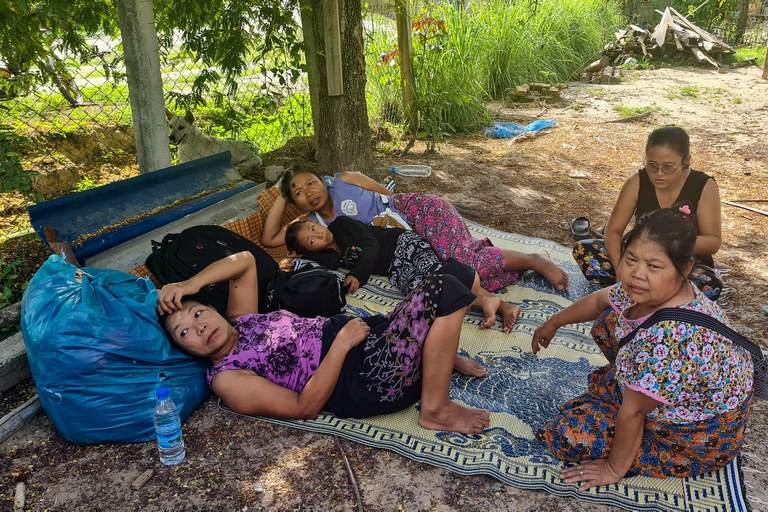Malaria cases on the rise along Thai-Myanmar border, health officials say
2022.11.26
 Myanmar refugees settle on the banks of the Moei River across from Mae Sot, Thailand, Jan. 4, 2022.
Myanmar refugees settle on the banks of the Moei River across from Mae Sot, Thailand, Jan. 4, 2022.
Malaria rates are spiking along the Thai-Myanmar border, health officials in the area said, as people flee fighting in Myanmar that has forced them to live exposed to the elements, increasing their chances of getting bitten by malaria-infected mosquitoes.
“These refugees are fleeing war. They have no home to live in – they stay under a bunch of bamboo trees or at the bank of a brook,” said an official at a camp in Myawaddy across the river from the Thai border town of Mae Sot.
Of the 1,140 civilians at the camp, about 5 percent are infected with malaria each month, he said, asking not to be identified for his safety.
“They still have to live at the bank of a brook in poor conditions until now,” he said. “That’s why more and more people were infected with malaria.”
In Mae Sot, the Mae Tao Clinic has seen malaria cases jump more than 10-fold this year. It treated only 20 patients for malaria last year, compared to 200 in the last nine months alone.
“Last month alone saw over 30 malaria patients,” said a doctor at the clinic who also requested anonymity. “The numbers are rising each month.”
Local organizations said they could see a short, but significant jump in malaria cases next month, and that it could worsen next monsoon season, which runs from July to October. The director of the Shoklo Malaria Research Unit (SMRU) in Mae Sot said malaria can behave in unpredictable ways, and even small rises in cases can create an epidemic.
“Things are going to get worse, not better,” said Francois Nosten, director of the center.
“In this kind of situation, it’s always the case that it’s going to get worse. Government authorities, NGOs, international NGOs, they should prepare themselves and they should organize themselves to be ready – because when it’s going to get worse, it’s going to get bad. We should not wait until things are bad, we should prepare ourselves now.”
In the past year, SMRU reported 1,500 cases of falciparum malaria, a potentially deadly strain, within Brigade 6 territory of Myanmar’s northern Karen State.
An official at a refugee camp near Myawaddy told Radio Free Asia that the poor living conditions were contributing to the rise in cases. Of the 1,140 civilians who are at the camp, about 5 percent are infected with malaria each month.
Myanmar has been wracked by civil war and turmoil since the military took control of the country in February 2021, intensifying long-standing conflicts between the government and ethnic rebel groups seeking greater autonomy.
A series of battles that flared between the Karen National Union and Burma Army have driven more than 186,000 people from their homes, according to a KNU press release in August.
More vulnerable fighters
The coup has driven more young people from the cities to join the People’s Defense Force and other armed ethnic organizations who are not as resistant to malaria as long-term residents are, Nosten said.
The same thing happened in the late 1980s, when young people from the city to fight in the jungles, he said.
“When the students arrived here in 1988, 1989 and 1990, more students died of malaria than died of fighting because they are not immune, they are city-dwellers.”

One young rebel fighter was laid low with a raging fever for a week after getting infected with malaria while going on a mission through the jungle. He had no access to any specific malaria medication, so he took only common fever pills.
“I was sleep-talking in pain,” he said. “Thank God the fever went down and I got back to normal.”
While his case was not fatal, health officials worry the overall situation could grow worse.
Even as medics at the border urge people at risk to avoid getting bitten, the nature of mosquitos carrying malaria means they can bite during the day. Nosten urged a prompt response from local officials in Karen state, as well as officials he is engaged with in Thailand.
He is thankful that malaria is a relatively easy disease to treat as long as patients get tested and medication quickly.
“It’s supply, disruption and access. When people have to run and move from one place to another, it’s difficult to access health care,” he told RFA.
“As soon as they have a fever, they need to get themselves somewhere they can get a diagnosis and treatment,” he said. “So that’s the most important thing to do. Malaria is easy to treat and it’s a benign disease if you treat it quickly.”
This story was produced by Radio Free Asia, a news service affiliated with BenarNews.







